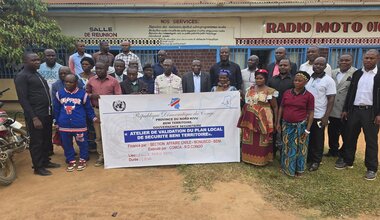MONUSCO and partners discuss security sector reform
Kinshasa, 30 July 2010 - On 20 July 2010, an important working meeting brought together the Security Sector Reform Section of the United Nations Organisation Stabilisation Mission in the Democratic Republic of Congo (MONUSCO), international partners from 12 partner countries, several UN agencies and a sizeable delegation from the Congolese Government.
On the agenda of the meeting, was the reform of the Congolese National Police (PNC). European Union (EU) and International Organisation for Migration (IOM) representatives made a presentation on identifying and collecting data on PNC personnel - an essential step towards modernizing police human resources management. This process, including delivery of professional ID cards to police personnel, will take 15 months for completion. The police component of MONUSCO proposed creating a joint implementing body for the reform process, which would be reporting directly to the Inspector General of the PNC to ensure that this reform project is implemented. General Patrick Sabiti, Inspector of PNC Training and Schools, requested UNPOL, EUPOL and the Police Reform Monitoring Committee (CSRP) to work together with the PNC to rapidly come up with a joint proposal to be submitted to political authorities.
UNPOL, with support from the Japan International Cooperation Agency (JICA), made proposals for ways of professionalizing elements of the territorial police, with a proposed initial project to train and equip three Mobile Intervention Groups (GMI) of the PNC. This process foresees establishing a total of 20 such GMIs. It remains to secure the support of technical and financial partners for these essential police training programmes to enable police forces to take over public responsibilities from national army (FARDC) battalions and thus restore State presence in pacified areas.
Representatives of the twelve member States and aid agencies stressed the need for establishing without delay a legal base for these reform efforts through enacting the draft organic law on PNC reform, which is still pending before Parliament, as well as the long-tem strategic framework and the three-year action plan for the implementation of these reforms, which have yet to be approved by the government. They also emphasized the importance of ensuring the regular payment of salaries of police forces. The Minister of Interior expressed his satisfaction in being able to exchange views with international partners. He thanked MONUSCO SSR Co-ordination for its efforts to help create Congolese ownership of the SSR process and to harmonise approaches among partners. He assured that a detailed report will be presented to the Deputy Prime Minister on all issues discussed and concerns raised by technical and financial partners.
This was the second time that representatives of the Congolese government participated in MONUSCO's SSR sessions, thereby demonstrating the will of the Congolese authorities to advance the police reform agenda. The coordination of efforts between national and international actors has resulted in the development of an effective police sector reform strategy.
 UN
UN United Nations Peacekeeping
United Nations Peacekeeping






